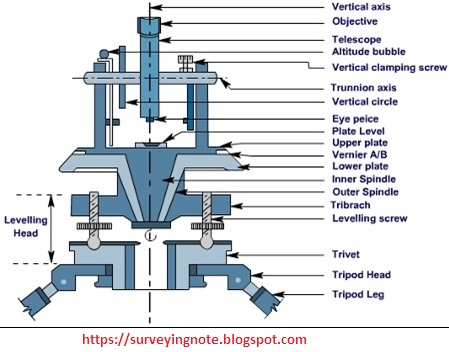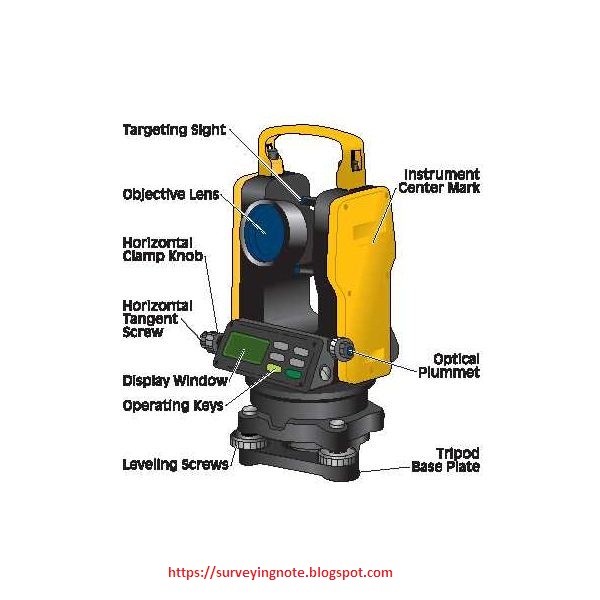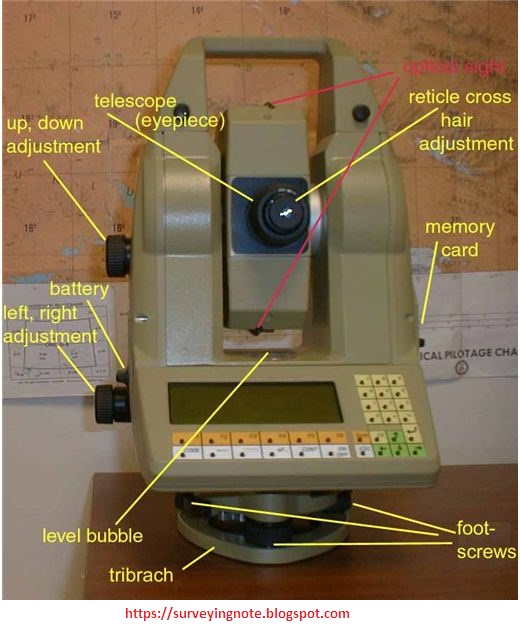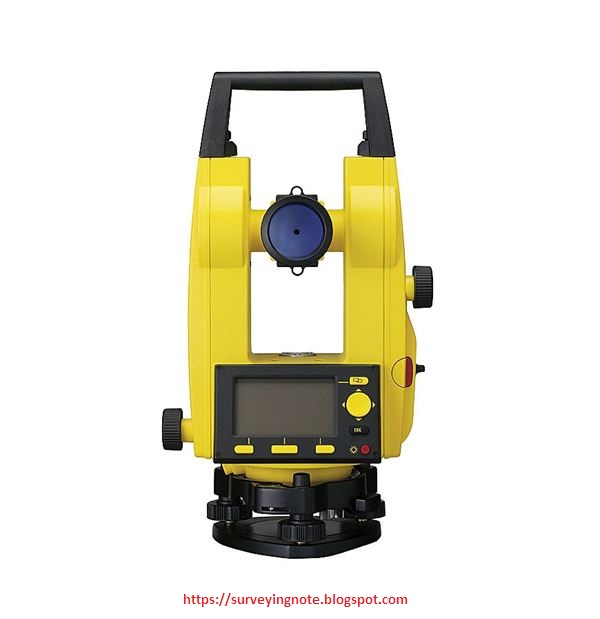Theodolite Survey
INTRODUCTION :
The theodolite is a confused instrument used generally for precise estimation of level and vertical
Face up to 10" or 20" , depending on insignificant count of the instrument. Because of its various livelihoods,
The theodolite is on occasion known as a boundless instrument. Coming up next are the unmistakable purposes for which the theodolite can be used
1 Measuring even edges
2 Measuring vertical focuses
3 Measuring redirection edges
4 Measuring appealing course
5 Measuring the even division between two focuses
6 Finding the vertical height of a thing
7 Finding the qualification of ascend between various core interests
8 Ranging a line.
Face up to 10" or 20" , depending on insignificant count of the instrument. Because of its various livelihoods,
The theodolite is on occasion known as a boundless instrument. Coming up next are the unmistakable purposes for which the theodolite can be used
1 Measuring even edges
2 Measuring vertical focuses
3 Measuring redirection edges
4 Measuring appealing course
5 Measuring the even division between two focuses
6 Finding the vertical height of a thing
7 Finding the qualification of ascend between various core interests
8 Ranging a line.
What is Theodolite?
Major considering instrument of dark origination anyway coming back to the sixteenth century English mathematician Leonard Digges; it is used to evaluate level and vertical focuses. In its bleeding edge structure it involves a telescope mounted to turn both equally and vertically.
A theodolite is a precision instrument for evaluating focuses in the even and vertical planes. Theodolites are used principally for investigating applications, and have been balanced for specific purposes in fields like metrology and rocket dispatch development. A front line theodolite involves a versatile telescope mounted inside two inverse hatchets the level or trunnion center point, and the vertical center point. Right when the telescope is pointed at a goal article, the edge of all of these hatchets can be evaluated with mind blowing precision.
A theodolite is a precision instrument for evaluating focuses in the even and vertical planes. Theodolites are used principally for investigating applications, and have been balanced for specific purposes in fields like metrology and rocket dispatch development. A front line theodolite involves a versatile telescope mounted inside two inverse hatchets the level or trunnion center point, and the vertical center point. Right when the telescope is pointed at a goal article, the edge of all of these hatchets can be evaluated with mind blowing precision.
THEODOLITES :
A Theodolite is an instrument for assessing both even and vertical edges, as used in triangulation frameworks, and geo-territory work. It is an instrument used in the land investigating and building industry, anyway theodolites have been balanced for other explicit purposes too. Other specific purposes make Theodolites ideal for shop and modern office floor organization of gadgets and mechanical assemblies. They moreover work commendably for position for the advancement of strong segments, pools, fairways, orchestrating, and road plan. Theodolite - Types Of Theodolite Survey, Digital Parts.
The level accuracy of Theodolites depends upon "seconds". A 2-second theodolite is more precise than a 5 or 9-second theodolite. If you consider the level circle that a theodolite turns around, the circle is isolated into 360 degrees. Each degree is isolated into 60 minutes, and each second disengaged into 60 seconds. Think "Degrees/Minutes/Seconds". The even point is the extent of slip-up (along these lines exactness) that a theodolite can on a level plane quantify or arrange inside. If a theodolites exactness rating is 2 seconds (made 2") by then its single going to lose 2 seconds of level estimation in a given division. When in doubt, a 9 second theodolite is for building goals where you're working commonly extremely close, say inside 200 feet from the instrument. A 2 second you would work 2,000 feet away and still work with some component of accruacy. Most structure authoritative laborers, whether or not private or business, can use a 9 second theodolite without experiencing issues due to precision. At this division, more bumbles are as human missteps, for instance, not leveling the instrument truly or taking a lively scrutinizing which fits human screw up.
The level accuracy of Theodolites depends upon "seconds". A 2-second theodolite is more precise than a 5 or 9-second theodolite. If you consider the level circle that a theodolite turns around, the circle is isolated into 360 degrees. Each degree is isolated into 60 minutes, and each second disengaged into 60 seconds. Think "Degrees/Minutes/Seconds". The even point is the extent of slip-up (along these lines exactness) that a theodolite can on a level plane quantify or arrange inside. If a theodolites exactness rating is 2 seconds (made 2") by then its single going to lose 2 seconds of level estimation in a given division. When in doubt, a 9 second theodolite is for building goals where you're working commonly extremely close, say inside 200 feet from the instrument. A 2 second you would work 2,000 feet away and still work with some component of accruacy. Most structure authoritative laborers, whether or not private or business, can use a 9 second theodolite without experiencing issues due to precision. At this division, more bumbles are as human missteps, for instance, not leveling the instrument truly or taking a lively scrutinizing which fits human screw up.
Digital Theodolites ET - 02 (Metal_Yellow)
Buy Now --- Link
TYPES OF THEODOLITE :
Theodolites may be thoroughly portrayed into two sorts
1) Transit theodolite
2) Non-travel theodolite
Travel THEODOLITE - In the movement theodolite, the telescope can be spun through an absolute distress about its even center point in a vertical plane.
NON-TRANSIT THEODOLITE - In the non travel theodolite, the telescope can't be spun through a complete surprise in the vertical plane.
1) Transit theodolite
2) Non-travel theodolite
Travel THEODOLITE - In the movement theodolite, the telescope can be spun through an absolute distress about its even center point in a vertical plane.
NON-TRANSIT THEODOLITE - In the non travel theodolite, the telescope can't be spun through a complete surprise in the vertical plane.
IMPORTANT TERMS RELATED TO THEODOLITE SURVEY :
Centering : The setting of theodolite decisively over a station set apart by strategies for plumb bob is known as centering.
Voyaging : The technique for turning the telescope about its even rotate in a vertical plane through 180' is named as voyaging.
All things considered, voyaging brings about a distinction in face.
FACE LEFT : It suggests that the vertical float of theodolite is on the left of the onlooker at the period of taking scrutinizing.
FACE RIGHT : This suggests the condition when the vertical drift of the instrument is on the benefit of the observer when the examining is taken.
CHANGING FACE : The movement of bringing the vertical float starting with one side of the onlooker then onto the next is known as developing face.
SWINGING THE TELESCOPE : This shows turning the telescope in a level plane. It is called 'right swing' when the telescope is turned clockwise and 'left swing' when the telescope is turned anticlockwise.
LINE OF COLLIMATION : It is a whimsical line experiencing the optical focal point of the objective glass and its continuation.
Center point OF TELESCOPE : The center is a nonexistent line experiencing the optical focal point of the thing glass and optical point of convergence of eyepiece.
Center point OF THE BUBBLE TUBE : It is a whimsical line random to longitudinal twist of air pocket tube at its inside point.
VERTICAL AXIS : It is the rotate of transformation of the telescope in the level plane.
Level AXIS : It is the rotate of transformation of the telescope in the vertical plane.
Fleeting ADJUSTMENT : The setting of the theodolite over a station at the period of taking any discernment is called brief change.
Immutable ADJUSTMENT : When the perfect association between significant lines is irritated , then a couple of frameworks are gotten to set up this relationship. This alteration is known as interminable change.
Voyaging : The technique for turning the telescope about its even rotate in a vertical plane through 180' is named as voyaging.
All things considered, voyaging brings about a distinction in face.
FACE LEFT : It suggests that the vertical float of theodolite is on the left of the onlooker at the period of taking scrutinizing.
FACE RIGHT : This suggests the condition when the vertical drift of the instrument is on the benefit of the observer when the examining is taken.
CHANGING FACE : The movement of bringing the vertical float starting with one side of the onlooker then onto the next is known as developing face.
SWINGING THE TELESCOPE : This shows turning the telescope in a level plane. It is called 'right swing' when the telescope is turned clockwise and 'left swing' when the telescope is turned anticlockwise.
LINE OF COLLIMATION : It is a whimsical line experiencing the optical focal point of the objective glass and its continuation.
Center point OF TELESCOPE : The center is a nonexistent line experiencing the optical focal point of the thing glass and optical point of convergence of eyepiece.
Center point OF THE BUBBLE TUBE : It is a whimsical line random to longitudinal twist of air pocket tube at its inside point.
VERTICAL AXIS : It is the rotate of transformation of the telescope in the level plane.
Level AXIS : It is the rotate of transformation of the telescope in the vertical plane.
Fleeting ADJUSTMENT : The setting of the theodolite over a station at the period of taking any discernment is called brief change.
Immutable ADJUSTMENT : When the perfect association between significant lines is irritated , then a couple of frameworks are gotten to set up this relationship. This alteration is known as interminable change.
 |
| Theodolite Survey |
Theodolite Components :
A central theodolite normally involves a little evaluated telescope that is associated with frameworks to measure level and vertical focuses. The theodolite telescope is fixed inside inverse hatchets, to be explicit the vertical rotate and the even, or trunion, center. The theodolite is fixed on a base that can be turned on a tripod by a leveling system. The edge to the perfect point is assessed by showing the telescope that point. The edge can be scrutinized on the telescope scale.Theodolite - Types Of Theodolite Survey, Digital Parts.
 |
| Theodolite Survey |
Repeating Theodolite :
Many edge readings are taken on a graduated scale. The ordinary edge estimation is gained by dividing the collected sum readings by the amount of watched readings. The eventual outcomes of these theodolites are extraordinary. Theodolite - Types Of Theodolite Survey, Digital Parts. These instruments are limited for territories where the assistance isn't consistent, or space for using other such instruments is constrained.
Direction Theodolites :
 |
| Theodolite |
Comparison of Theodolite And Total Station
Both the total station and theodolite are devices for the estimation of vertical and level edges in the midst of structuring adventures and contemplating. Each ha unequivocal traits as a result of which they are used. Commonly, the factors of time, aptitude open, and cost will choose the usage of both of these instruments. In any case, the genuine differentiations in these investigation instruments are explained underneath. Theodolite - Types Of Theodolite Survey, Digital Parts.
Theodolite :
A theodolite consolidates a sensible telescope that is fixed between the level and vertical hatchets. The hatchets edge can be resolved decisively just if the head has enough information with respect to trigonometry. Additionally, a theodolite normally needs the assistance of one individual moreover the overseer, to empower the estimation and plan of edges. To ensure accuracy, both the heads should have the ability to level the tripod and the assessing post. Also, they should have the ability to alter the evaluating line and the stake to get an accurate data. Numerical and graphical capacity is also required to convey the best possible data. A theodolite is conventionally used for minimal size plots. In the front line theodolites, the examining of the vertical and even circles is executed electronically by a rotating encoder. Moreover, sensors are included to allow auto-centering and customized estimations by using indispensable programming. Some propelled theodolites have electro-optical detachment evaluating gadgets, for the most part infrared, permitting simultaneous estimations of the vectors. Theodolite - Types Of Theodolite Survey, Digital Parts.
Total Station :
A flat out station is seen as a superior considering mechanical assembly differentiated than the theodolite due with its propelled mix and complete features. A flat out station solidifies the components of theodolite to choose edges and partitions by an electronic detachment meter. Hard and fast stations use a mix of lasers and precious stones to record propelled readings of the estimations in a PC. This data can be used further examination. Mechanical total stations have been developed that can be worked distantly. In any case, the full scale stations are expensive and need outline aptitude, yet also quick and dirty planning on programming. Complete stations are sensible for study necessities over immense partitions, particularly over irksome domain. The results of a hard and fast station on such conditions are progressively exact. Theodolite - Types Of Theodolite Survey, Digital Parts.
 |
| Total Station |
theodolite surveying lecture :
QUESTION AND
ANSWER
1 What type of theodolite?
= 2 type
2 What is 2 type theodolite name?
= transit and non-transit
3 What is fece-left position is called
= face left observation
4 What is fece-right position is
called
= face right observation
5 The face left position is known
= telescope normal
6 The face right position is known
= telescope inverted
7 The least count of the vernier
theodolite
= 20”
8 Bowditch’s rule correction to latitude of any side
= length of that side / perimeter of
traverse * total error in latitude
9 Bowditch’s rule correction to departure of any side
= length of that side / perimeter of
traverse * total error in departure
10 Transit rule correction to latitude
of any side
= latitude of that side / arithmetical
sum of all latitudes * total error in latitude
11 Transit rule correction to
departure of any side
=departure of that side / arithmetical
sum of all departure * total error in departure
12 Third rule correction to northing
of any side
= northing of that side / sum of
northings * ½ total error in latitude
13 Third rule correction to southing
of any side
= southing of that side / sum of
southings * ½ total error in latitude
14 Third rule correction to easting of
any side
= easting of that side / sum of
eastings * ½ total error in departure
15 Third rule correction to westing of
any side
= westing of that side / sum of
westings * ½ total error in departure
16 The teodolite diameter
= 12 cm
17 The true bearing of a line is also
called
= azimuth
18 The horizontal axis is also known
as
= trunnion axis
19 A thodolite in which the telescope
can be revelved through a complete revolution in a vertical plane is
= transit theodolite
20 The size of the theodolite is
defined according to
= diameter of graduated horizontal
circle
21 In a closed traverse, the algebraic
sum of departure and latitude must be equl
= 00
22 Fine adjustment in a theodolite is
done by
= tangent screw
23 The included angles of the traverse
are measured
= clockwise
24 For improved accuracy, the included
angles is measured by
= repetition method
25 The characteristic of Gale’s table
is that independent coordinates of all points are brought to
= first quadrant
26 Balancing of traverse is done
according to
= transit rule
27 In a theodolite a straight line
tangential to the longitudinal curve of the level tube at its centre
= line of sight
28 In an internal focusing type
telescope the lens provided is
= concave
29 The angle between the prolongation
of the preceding line and the forward line of a traverse is
= deflection angle
-------------------------------------------------
Best Surveyor Book Buy -- Link
Chain Surveying Note -- Read
Compass Traversing Note -- Read
Plane Table Survey Note -- Read
Levelling Survey Note -- Read
Contouring Survey Note -- Read
Area Formula Note -- Read
Thank You...














0 Comments:
Post a Comment